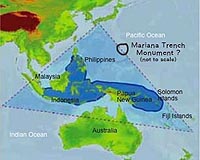| . |  |
. |
Manado, Indonesia (AFP) May 11, 2009 A key global conference on oceans opened Monday in Indonesia with a warning that climate change will accelerate the destruction of already precious marine resources. Officials and ministers from more than 70 countries are meeting over five days in the port of Manado in a bid to influence crucial climate change talks in Denmark in December. It is being touted as the first time they have got together to consider how rising temperatures could impact sea levels and dwindling fish stocks. The environment, fisheries and resources ministers are expected to pass a joint declaration aimed at influencing the climate change talks in Copenhagen that will hammer out a successor agreement to the expiring Kyoto Protocol. "It is clear that our precious marine resources are under dire and increasing threat and that in many parts of the world climate change will accelerate their destruction," Indonesian Maritime Affairs and Fisheries Minister Freddy Numberi said. Conference organisers say the meeting fills a much-overlooked gap in the global response to climate change, which has concentrated on cars, factories and forests while ignoring oceans. "Basically if you didn't have oceans you wouldn't have a climate... that sort of link and understanding isn't being talked about in climate change discussions," United Nations Environment Programme marine unit head Jacqueline Alder told AFP. But unlike when dealing with emissions from land, scientists say a lack of knowledge on how oceans and climate interact means discussions on including oceans in a future agreement are at an early stage. Around 25 percent of human greenhouse gas emissions between 2000 and 2007 were absorbed by the oceans, but beyond that "we can't predict -- it's a combination of the science and the data," Alder said. "Although we might not get much done at COP 15, if we don't get (oceans) onto the agenda we'll spend the next five to 10 years in the backwaters," she said, referring to the Copenhagen talks. Nations hope to be able to lay the groundwork for the establishment of a system that would provide funding to countries to preserve key marine environments that help prevent climate change, she said. But some delegates at the conference said any such far-reaching plan would be unworkable. "From a purely economic point of view I'm pessimistic about using the oceans to bury carbon," director of the US-based Scripps Institution of Oceanography Tony Haymet said. The UN Intergovernmental Panel on Climate Change predicted in 2007 that sea levels may rise by up to 59 centimetres (23 inches) by the end of the century, drowning low-lying island nations. Scientists also say rising temperatures and over-fishing could lead to the collapse of key species that feed millions and help preserve key ecosystems. Environmental group WWF says breeding populations of tuna will be wiped out in the Mediterranean in three years. Indonesia, an archipelago nation of 17,000 islands, has seen massive damage to its marine ecosystems through pollution and illegal fishing, including the widespread use of bombs and cyanide. Despite massive preparations for this conference, rubbish and diesel oil clog the port of Manado, which is just kilometres (miles) from a famous reef reserve on Bunaken island. Meanwhile, leaders from six countries -- East Timor, Indonesia, Malaysia, Papua New Guinea, the Philippines and the Solomon Islands -- will meet on the margins of the conference to launch a plan to save the Coral Triangle, a vast underwater ecosystem that is home to more than half the world's coral reefs. The area, referred to as the ocean's answer to the Amazon rainforest, has the highest marine biodiversity anywhere on earth. Share This Article With Planet Earth
Related Links Water News - Science, Technology and Politics
 Fight to save the 'Amazon of the oceans'
Fight to save the 'Amazon of the oceans'Nusa Lembongan, Indonesia (AFP) May 10, 2009 With its pleasure boats dipping on the horizon and clustered tourist restaurants, the Indonesian island of Nusa Lembongan looks little like the edge of a great wilderness. But according to scientists, this small and scrubby island off Bali is one corner of a huge marine ecosystem touted as the most diverse on earth -- and a key environmental battleground for a planet grappling with climate ... read more |
|
| The content herein, unless otherwise known to be public domain, are Copyright 1995-2009 - SpaceDaily. AFP and UPI Wire Stories are copyright Agence France-Presse and United Press International. ESA Portal Reports are copyright European Space Agency. All NASA sourced material is public domain. Additional copyrights may apply in whole or part to other bona fide parties. Advertising does not imply endorsement,agreement or approval of any opinions, statements or information provided by SpaceDaily on any Web page published or hosted by SpaceDaily. Privacy Statement |